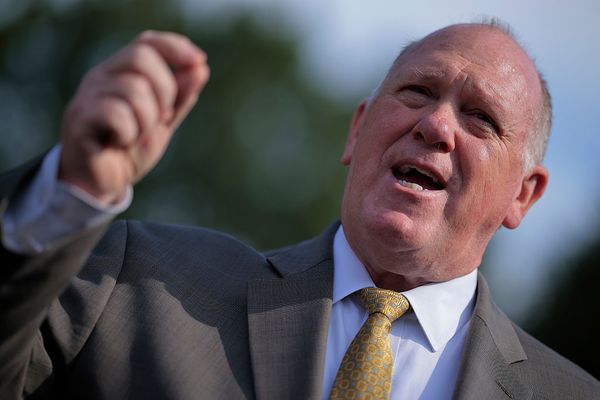
Colorado Republicans are asking the US Supreme Court to reverse a state Supreme Court ruling that removes Donald Trump from the state’s ballots in 2024.
The request from the Colorado State Central Republican Committee to the nation’s highest court on Wednesday follows an historic ruling from the Colorado Supreme Court that finds the former president is constitutionally ineligible from holding office over his role in engaging in the January 6 attack on the US Capitol.
Mr Trump’s own legal team has suggested it intends to file its own appeal, while his campaign battles similar lawsuits challenging his eligibility to appear on 2024 ballots across the US.
The plaintiffs leading the Colorado lawsuit urged the US Supreme Court on Thursday to expedite their review of the case, which “involves issues of exceptional national importance” and needs to be quickly resolved ahead of a crucial deadline for ballot preparation ahead of the 5 March primary election.
Colorado’s ruling is paused until 4 January, one day before a state deadline to certify ballot contents. But that date could extend indefinitely if the Supreme Court decides to take up the appeal before issuing a final decision at a later date. Mr Trump will remain on the ballot, for now, pending that appeal.
The US Supreme Court’s decision on whether it picks up the case could have resounding impacts beyond Colorado, and could ultimately provide nationwide guidance on the issue in a growing number of challenges across the country.
Plaintiffs have asked the state’s GOP and Mr Trump’s legal team to file a brief to the high court in response by 2 January.
But if Mr Trump does not file his own appeal by noon on Friday, the plaintiffs have requested that the Supreme Court “order Trump to file any such petition” by then. Plaintiffs will then file a response to his filing by noon on 4 January.
And because Colorado is largely a vote-by-mail state, the issue must be resolved by the time county clerks mail ballots to overseas voters to be returned in time to count them by 5 March, also known as Super Tuesday, when the greatest number of states participate in primary elections.
“Thus, having a decision on the merits by February 11 would ensure that every in-state Colorado voter knows of this Court’s decision before receiving their ballot and casting their primary vote,” attorneys for the plaintiffs wrote on Thursday.
Colorado Secretary of State Jena Griswold, whose office handles elections, said the state’s Supreme Court “got it right” and urged the nation’s high court to “act quickly given the upcoming presidential primary election”.
In their petition to the Supreme Court, Jay Sekulow and other attorneys for the state’s GOP said the Colorado court’s interpretation will open the door for anyone to challenge candidates’ eligibility, and that there is “a real risk” that the “flawed and unprecedented analysis will be borrowed, and the resulting grave legal error repeated.”
The petition was filed hours after the Michigan Supreme Court rejected a similar 14th Amendment lawsuit targeting Mr Trump’s eligibility, which means his name will remain on ballots there.
Section 3 of the 14th Amendment, among newly enshrined amendments enacted in the aftermath of the US Civil War, prohibits anyone who has sworn an oath to uphold the Constitution and “engaged in insurrection or rebellion” from holding public office.
The Colorado GOP – which is also a party in the case – argues that the state’s Supreme Court misinterpreted that amendment and interfered with its First Amendment rights of free association.
“For the first time in American history, a former president has been disqualified from the ballot, a political party has been denied the opportunity to put forward the presidential candidate of its choice, and the voters have been denied the ability to choose their chief executive through the electoral process,” attorneys for the state’s Republican Party wrote in their petition.
The filing also argues that Section 3 only applies to officials who swore oaths to serve in Congress or state legislatures, not the presidency, and that states don’t have enforcement power because Congress has not given them the authority.
Section 3 states that no one who has sworn an oath to support the Constitution to “hold any office, civil or military, under the United States, or under any State … shall have engaged in insurrection or rebellion against the same, or given aid or comfort to the enemies thereof.”
After an appeal to the state’s highest court this month, Colorado justices wrote in a 4-3 majority opinion that “President Trump did not merely incite the insurrection.”
“Even when the siege on the Capitol was fully underway, he continued to support it,” they continued. “These actions constituted overt, voluntary, and direct participation in the insurrection.”
The ruling determined that his “direct and express efforts, over several months, exhorting his supporters to march to the Capitol to prevent what he falsely characterized as an alleged fraud on the people of this country were indisputably overt and voluntary.”







